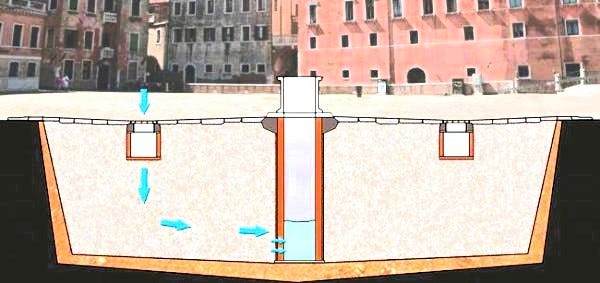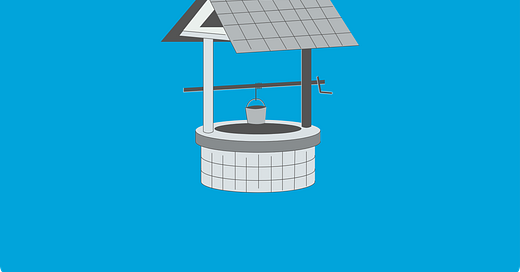How Venice got fresh water
A story, quote and lesson about filtering out the good from the bad
How often do you think about access to fresh water?
For early Venetians, this was a problem they faced every day. Although the city they lived in was built on water, they were surrounded by an undrinkable saltwater lagoon. With no natural rivers or lakes on the islands, the Venetians relied on rainwater, which is notorious for being unreliable and intermittent. But this didn’t stop the Venetian engineers from devising an ingenious solution.
Beginning in the 11th century, they leveraged the natural clay-like properties of Venetian soil to build wells or cisterns that capture rain and turn it into fresh, drinkable water. They dug deep holes, usually 3-5 meters deep, and filled them up with sand or gravel to filter out the water, while keeping a hole in the middle for access later on. So now, every time it rained, previously unused courtyards or fields became funnels for the falling rain to become fresh water.
Having previously relied on bringing in fresh water in barrels, this solution helped the +170,000 Venetians living on the island get access to fresh water and keep a steady supply of it year round. It is one of the many feats of engineering that allowed Venice to remain a relevant power in the global economy despite its geographical challenges.

After the end of the Venetian Republic, the well system fell out of use due to poor maintenance and a lack of proper administration. The now-Italian city chose to begin the construction of a modern aqueduct from nearby Moranzani to Venice.
By 1884, this new aqueduct provided a continuous supply of fresh water from the mainland, replacing the centuries-old reliance on rainwater wells. However, the legacy of the Venetian wells endures as a testament to human ingenuity and problem-solving. These cisterns weren’t just about providing water; they symbolized the Venetians’ ability to thrive in the face of adversity.
“Venezia è in acqua ma non ha acqua (Venice is in the water but has no water)”
Marin Sanudo, Venetian historian and diarist from the early 1500s
In a sense, the Venetian well system offers us more than a historical lesson—it provides a powerful metaphor for our own lives. Just as the wells filtered out impurities to produce clean water, we too must filter out the noise and distractions in our daily lives to focus on what truly matters.
Though the wells no longer serve as Venice’s main source of water, their existence is still remembered as a remarkable feat of engineering. They remain a symbol of the power of thoughtful, creative solutions to seemingly impossible challenges. Today, the Venetian wells stand as a reminder that sometimes, the best way forward is to strip away the excess and focus on the essentials.
So now I ask you:
What can you filter out to bring more clarity and purpose into your life?





Maravillosa reflexión, para la vida. Además superinteresante. Gracias.